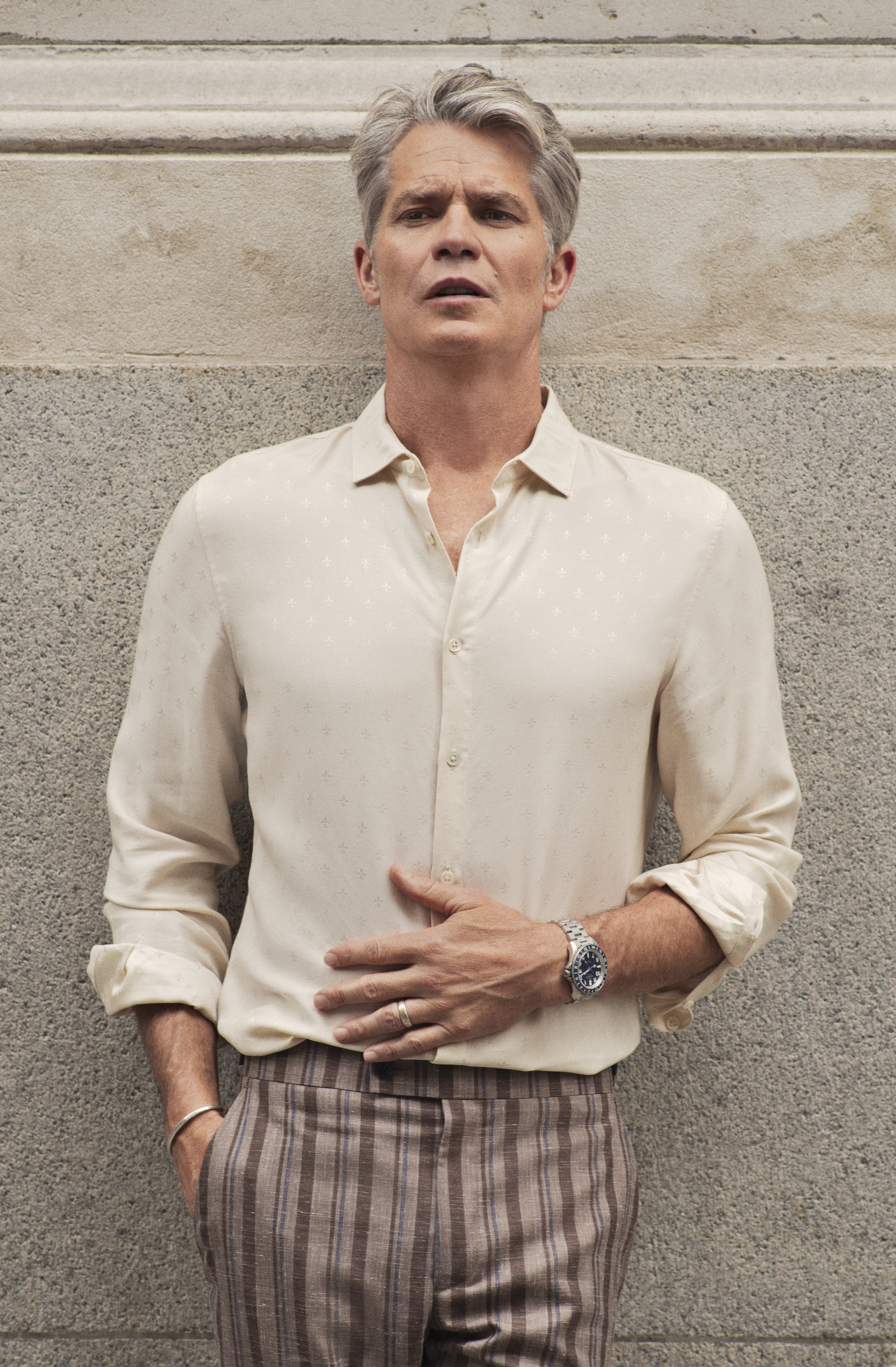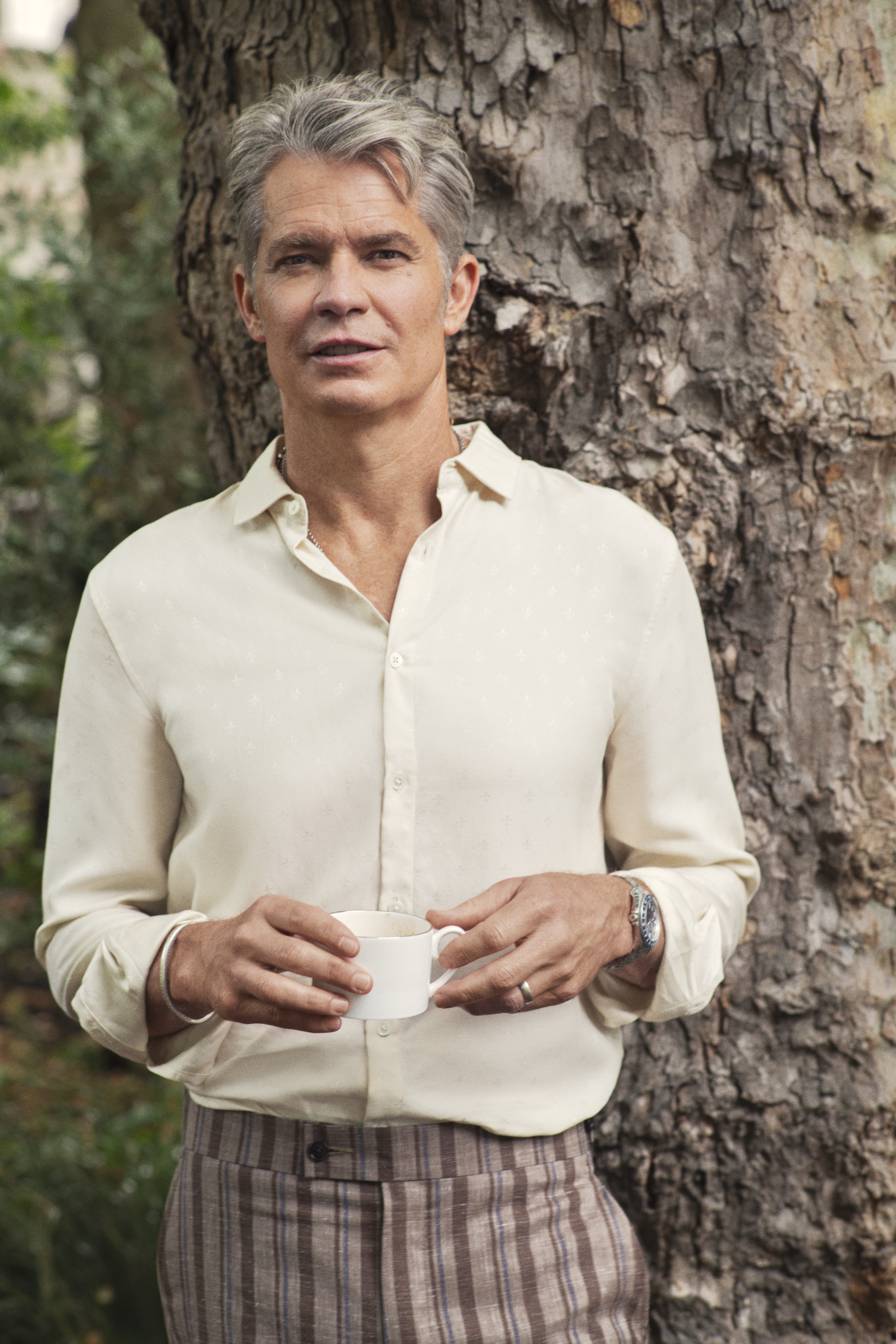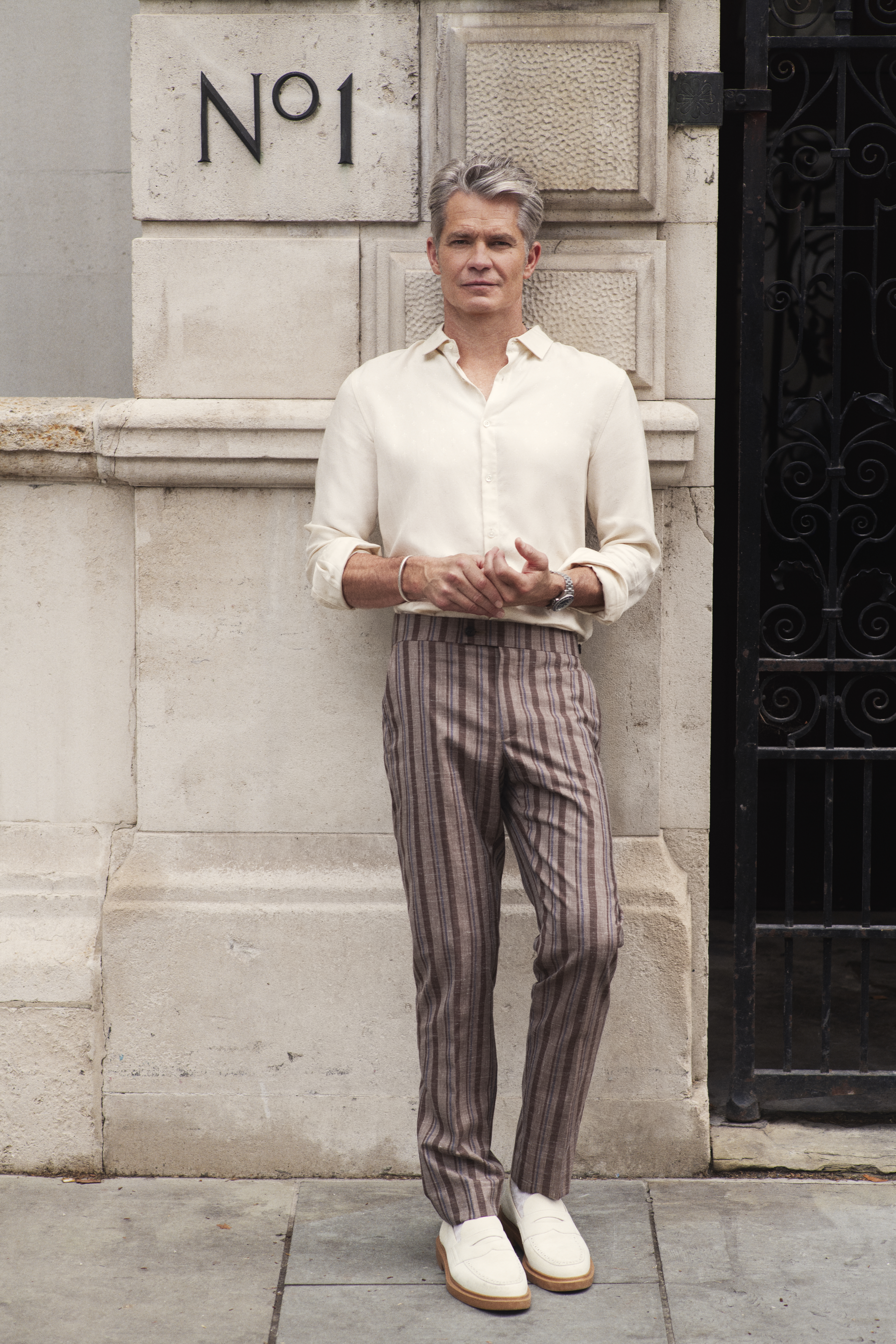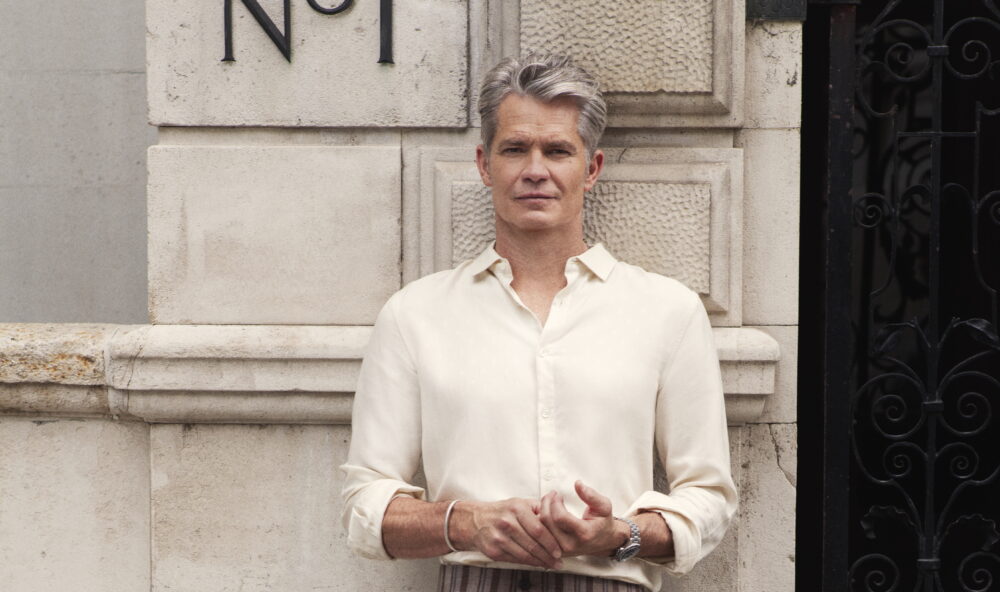
Timothy Olyphant, photographed by Simons Finnerty.
Over three decades in Hollywood, Timothy Olyphant has starred in some of the most beloved series of the prestige television era, from Deadwood to Justified. It’s been a few years since he brought his considerable gifts to a leading role on the silver screen, but that changes this month with FX’s Alien: Earth, Noah Hawley’s high-octane spin-off of the original Alien franchise. Airing now on Hulu and executive produced by Ridley Scott himself, the show finds the 57-year-old actor working in new, somewhat more machinelike terrain—here, he plays a bleach-blonde robot named Kirsch, the chief scientist at the Neverland research facility. But when Olyphant got on a Zoom with his friend and fellow industry veteran Owen Wilson earlier this month, he had other things on his mind, including but not limited to coffee, swimming, ceramics, Mark Rothko, Elmore Leonard, and his early days as a fledgling young actor. “I don’t know about you,” he said, “but it’s hard to figure out what part of this is just dumb luck or if I had a good judge of character and asked the right people for direction.” It’s safe to say that a bit of talent helped, too. Below, Olyphant and Wilson take a walk down memory lane, beginning with the time he showed up unannounced at the door of William Esper Studios.
———
OWEN WILSON: Hey, buddy.
TIMOTHY OLYPHANT: Dude, you’re the best. Thanks for doing this.
WILSON: Oh, thanks for asking me.
OLYPHANT: You’re very kind to say that. Sorry, I was logged on minutes ago, but apparently there was a meeting ID and it took me a sec to find that.
WILSON: Oh, god. Don’t get me started on those meeting IDs and passwords.
OLYPHANT: I love that you have questions.
WILSON: I do got questions.
OLYPHANT: You wrote them down?
WILSON: Yeah. So I’m here in Vancouver and I’m staying in the building that you visited, and your presence is still felt because even today I met the great guy who works here at the building.
OLYPHANT: Front door?
WILSON: Yeah. I said I was going to be talking to you and he said, “Oh, Mr. Olyphant, he swims like a dolphin.” And I said, “I haven’t seen him swim, but he looks like a swimmer.” I do know from talking to you that you’re interested in swimming, so talk about that a bit.
OLYPHANT: [Laughs] Wait, I also know that you’re interested in swimming, or at least you’ve feigned to be, because I recall you asking me about goggles. Where is your swimming career right now?
WILSON: I never got goggles and I never swam laps in that pool. I do think it’s great exercise and there was a period where I would go to that pool at UCLA, the outdoor one, and swim a mile there.
OLYPHANT: I was there this morning.
WILSON: That’s a great one.
OLYPHANT: I want to tell you something real quick if I may, but finish your thought about your swimming.
WILSON: I love exercising. It’s important to me. And in Malibu, where I lived, I’d swim there. And then, I don’t know, it kind of disappeared from my life and I don’t know why, other than I can check out when I’m doing the treadmill or jogging. I find swimming is more of a mental challenge, being left with my thoughts. I like to check out from my brain when I’m exercising. But I still have that idea of getting back into it, which was probably why I was asking you about goggles.
OLYPHANT: While you’re in Vancouver, the giant outdoor pool down in Stanley Park, have you seen it?
WILSON: Of course. I was over there the other day because I go in the ocean right there, but there’s also the great one in Kitsilano that’s even better than the one in the park.
OLYPHANT: I found that place to be, dare I say, a treat.
WILSON: I did actually swim today, but it was in a river and it was very cold mountain spring water.
OLYPHANT: Look at you living the good life.
WILSON: Do you do any of this wellness stuff that’s popular now? Like an ice sauna?
OLYPHANT: I’m willing to try. I know you’re bringing in the big bucks, so if you feel like getting me a sauna for Christmas I’d give it a shot.
WILSON: [Laughs] Okay so no ice sauna, but any biohack stuff?
OLYPHANT: Oh, no.
WILSON: You don’t do any of that coffee that has MCT oil?
OLYPHANT: No, I like my espresso every morning. I consider myself a bit of an aficionado, but that’s not what you’re talking about.
WILSON: Bulletproof. But you do read about caffeine being actually good for you.
OLYPHANT: My interest in coffee came more from when I was in college and I was studying painting. I was like, “This is the life. I’m going to paint and drink coffee like real artists do.”
WILSON: I didn’t start drinking coffee until I was in my forties and it was only because I’d read an article talking about how it’s performance-enhancing, and I was having these really heated tennis matches with my friend, so I started drinking it just before our matches to try to get an edge. I never had it up until then, even though I liked coffee ice cream and the way it smelled, so I was open to it. But now I’m an everyday coffee person. Sometimes I have a hot espresso, but I really prefer it to be cold brew or something like that.
OLYPHANT: You start the day with the cold?
WILSON: Well, I’m also not a big soup person. I don’t like hot.
OLYPHANT: I start off with a freshly pulled espresso shot and then later in the day I’m like, “You know what? I might ice one.”

WILSON: Good. Well you talked about being interested in painting. What are some of your favorite museums and some of your favorite painters?
OLYPHANT: I still love going to MOCA. It’s so funny going to it now because when my wife and I go there, there’s not that many people, and you walk across the street to the Broad and it’s packed.
WILSON: So Broad is jammed, but the MOCA across the street is not?
OLYPHANT: Because the kids love the Broad and they love Instagramming at the Broad in front of the very Instagrammable artists or something.
WILSON: What paintings do you look for there when you go?
OLYPHANT: They often have a lovely room of [Mark] Rothkos.
WILSON: I didn’t know that. I love Rothko.
OLYPHA Really? He’s one of those guys who I didn’t think I would’ve loved, but I always stop for a few minutes in front of a Rothko.
WILSON: I sometimes have a hard time because I didn’t study art history, so I get influenced by when I know a little bit about the artist. And so Rothko, I happened to watch one of those American Masters PBS things and I liked him so much in that.
OLYPHANT: There’s very few artists that I really love that I don’t like their personality.
WILSON: Yeah. So we got MOCA.
OLYPHANT: I love the Whitney, but I still am very fond of the old Whitney in New York.
WILSON: That’s on the Upper East Side?
OLYPHANT: The old Whitney is on the East Side. I want to say it’s in the seventies. I realize now we’re in Interview and there’s going to be a bunch of people that are like, “No, you dumb shits.”
WILSON: [Laughs] That’s okay.
OLYPHANT: [Laughs] We should be doing this interview in fucking People. People would be like, “Wow, these guys are really cultured.”
WILSON: [Laughs] Are you a big reader?
OLYPHANT: Yes, and I’m also guilty of often not even knowing the name of the book I’m reading. It’s terrible, but I just started a book by… He wrote this wonderful book a couple years ago that just blew me away called… Shall I run and grab it?
WILSON: Yeah, go grab it.
OLYPHANT: Hold on two secs.
WILSON: Take your time.
OLYPHANT: I’m reading a book by Kevin Wilson called Run for the Hills. He wrote a book called Nothing to See Here. It was one of my favorite books a few years ago. Have you ever read that book?
WILSON: No, I’m writing it down.
OLYPHANT: It’s about a guy who’s been nominated to be, I think, district attorney, and he’s got two kids and they can light themselves on fire. They burst into flames every now and then.
WILSON: It doesn’t hurt them when they’re on fire?
OLYPHANT: Doesn’t hurt them, but it could be dangerous. And they’re really concerned about how it’s going to affect the father and his nomination, so they’re trying to keep the children under wraps. It’s a metaphor, Owen.

WILSON: What books do you remember liking from school? Were there any that you really loved and then maybe your kids read them?
OLYPHANT: The ones that jump to mind are not the ones you’re asking about because the books that I loved as a kid that I got to then read to my kids, which was such a wonderful experience, were things like Phantom Tollbooth or Treasure Island.
WILSON: Treasure Island.
OLYPHANT: Oh my god, that’s a good book.
WILSON: It stands up, dude. It’s intense. I was on a set where that was somebody’s house and it was on the bookshelf and I was like, “Okay, let me see what this thing’s like.” And then you’re there for a few days, so every day that you show up you’re like, “Okay, let me take it.” I read the whole thing and I’m like, “God, it’s good, man.”
OLYPHANT: So thrilling.
WILSON: Yeah. I just talked to my brother Luke saying, “I’m going to be talking with Tim.” And he said, “Oh, ask…” Because Luke loves Elmore Leonard and he’s always trying to get me to read Elmore Leonard.
OLYPHANT: Wait, you were in an Elmore Leonard movie.
WILSON: Yeah, I certainly never met him. Did you? Luke seems to think that you might have met him.
OLYPHANT: Yeah, I got to spend time with him. That was really a treat.
WILSON: What was that like?
OLYPHANT: He didn’t disappoint. He was just really, really cool. Came out to the set, that’s the first time I met with him. He had kind of a cool humor. He talked about this, but I experienced it firsthand before it was out in the press. My character in the book had a very specific hat, and when I went to try hats on, I put it on and I didn’t love it. And I was like, “I’m going with this other thing.” I went with something that was a little more of a western-y look. And he hated that I didn’t have the hat that I was supposed to have. I remember hanging out with him on set, we’re getting along great, and then he said to me, “Don’t feel like you got to wear the hat all the time.” And I was like, “No?” He goes, “No. In fact, you could lose it.” And I said, “How would we lose it?” He goes, “A gust of wind could just come by and just blow it away.” [Laughs]
WILSON: [Laughs]
OLYPHANT: I’m like, “This old fucker. He really has no problem needling me about this thing.” But then years later, it grew on him. it. He would sometimes come and do press with us, and then I got to go out and do press with him when he was promoting his book, because he wrote a Raylan book because the show got him going.
WILSON: Right.
OLYPHANT: He did me this tremendous favor, because when I first started acting, I tried to do a character like, “What was he like in high school?” Or whatever the fuck. And quite honestly, it was hard for me to admit that I was like, “This isn’t doing anything for me. It’s just confusing me.” I got bogged down by it and after a while I just stopped doing it. And I think [David] Mamet gave me some permission to just be like, “Disregard character, just lines on the page, memorize your lines, know what you’re doing and show up.” And I started getting really, really simple. Started having a lot of fun. But long story short, if that’s still possible, I still sort of hid it in terms of talking about that. Now, I’m sitting next to Elmore Leonard, we were doing press, and a journalist asked us both about Raylan’s childhood and his early years and asked us a question about if either one of us could expand on that. And I’m about to say, “I have no fucking idea. I haven’t given it any thought.” But I didn’t want to offend Elmore Leonard. So I gestured to him like, “Why don’t you take this question?” And Elmore Leonard said, “I have no fucking idea.” [Laughs]
WILSON: [Laughs]
OLYPHANT: It was such a gift that he gave me. Sorry, that was long-winded.
WILSON: No, it was great. When somebody does believe in you, we all need that. Can you think of somebody that showed some belief in you and gave you some confidence or a mentor that you look back and go, “God damn, that really helped me”?
OLYPHANT: I don’t know about you, but it’s hard to figure out what part of this is just dumb luck or if I had a good judge of character and asked the right people for direction. In terms of my acting journey, I got really lucky when someone pointed me in the direction of, “Go to New York, look up the William Esper Studio and Sanford Meisner.” When I read those books and when I went and knocked on William Esper’s door and said, “My wife and I drove across the country and I’m here to take acting classes,” with no experience of any kind, I got so lucky that that man was in my life early on because he’s just a class guy with a really simple, strong ethic about being good at a craft and being a working-class actor and setting standards. He gave me a great deal of confidence.

WILSON: He saw something in you and believed in you. That leads me to another thing. Can you give me an example of a director really helping you with an idea or maybe steering you back on course?
OLYPHANT: I’ll give you my favorite. Walter Hill on the set of the Deadwood pilot—we had a read-through a day or two before we’re about to shoot. I’d barely spoken to Walter Hill, but after the read-through, I pulled him aside and said, “It occurs to me we haven’t really spoken much about the role, and the next time I see you, it’ll probably be on set.” And he looks at me and goes, “That’s not such a bad thing.”
WILSON: [Laughs] I love that.
OLYPHANT: And he goes, “You’re going to be great.” He said, “I will tell you one thing, and I don’t know if they teach this in acting classes, but you’re the quote ‘hero’ of the piece.” And he goes, “[Ian] McShane, obviously he’s the other big part of this piece, but McShane, he’s got a lot to say and he’s doing all this stuff. I’m going to be shooting him wide, but sometimes with you, I’m going to be coming in real close while people are talking to you.” And I said, “Yeah, okay, so what are you saying?” He goes, “Well, when people are talking to you, be thinking about something.” And I go, “That’s it?” He goes, “Yeah, that’s it. Just be thinking, you got stuff in your mind.” And I’m like, “Okay, I got it.” He goes, “I’ll see you on set.” I don’t think I really interpreted that note until years later when we were doing Justified. And I remember being on the set of the pilot, and I was in this scene with Joelle Carter and she has this amazing monologue where she’s showing me all around her house and offering me drinks, and there’s a bloodstain on her carpet because she’s killed somebody. And I’m playing a cop and I realize, because cops will tell you this, that when you’re in the house and she’s talking to you and she’s making a drink, keep in mind your head is on a swivel. You’re taking in everything around the house—you’re looking, you’re clocking everything. And I was like, “This is what Walter Hill was talking about.” [Laughs]
WILSON: [Laughs] Thinking of self.
OLYPHANT: It’s active, right? You’re collecting thought. It’s not that you’re not listening, but if you notice when you’re talking to cops—
WILSON: Oh yeah, that’s a great example.
OLYPHANT: They’re looking around at everything, right?
WILSON: Yeah. They have zero interest, they’re asking to just keep it going as they’re clocking all this other stuff.
OLYPHANT: Always be scanning.
WILSON: That’s good, man. These are a little bit gimmicky, but sometimes they’re okay. Describe your perfect day.
OLYPHANT: Today has been pretty good. Got a little swim in this morning, now I’m talking to you. You know what I mean? I’m hanging here with the dogs in my house and my wife and I are going to go to the studio, play around with clay and have a cocktail. This is a good day.
WILSON: First concert?
OLYPHANT: I’ll give you two answers. The first one, just me and my brother and one of my buddies went on our own. We went up to Stockton from Modesto to see Joan Jett and the Black Hearts.
WILSON: Oh, that’s good.
OLYPHANT: When I was a kid, maybe junior high, my dad took us to Marvin Gaye in Oakland. Very memorable.
WILSON: Gosh, that’s pretty good. What’s a line from one of your roles that people quote back to you the most?
OLYPHANT: “Is the juice worth the squeeze?” The movie was called Girl Next Door, a fun little flick. I get it all the time. Guys will come up to me. It’s always guys.
WILSON: Yeah. What character has been your favorite to play, and do you feel like you’d know while you’re working if something’s going to be good or have you found there’s no way of telling?
OLYPHANT: I remember talking about this with you on the set. You said, “If only the amount of fun you were having while making it added up to how good the final thing was.”
WILSON: Oh, god, that sure is true.
OLYPHANT: I’m guilty of feeling like I do have a good sense of whether it’s going to play or not.
WILSON: I do.
OLYPHANT: I know the popular thought out there is, “You never know.” I call bullshit on that. I think you do know. I think you know when you read a script. I know there’s still ways to screw up a script, but I feel like, when you’re on a set, you know whether you’re in good hands or not. And I feel like, when we’re doing a scene, I know whether it plays. Do you?
WILSON: Yes, I agree with that. It’s like a baseball player hitting. There’s very few people that are just batting 1,000 percent. But that has been nice with this show because, of course, that’s how we worked together here in Vancouver last summer.
OLYPHANT: We were in the same sandbox. I remember thinking the same thing.

